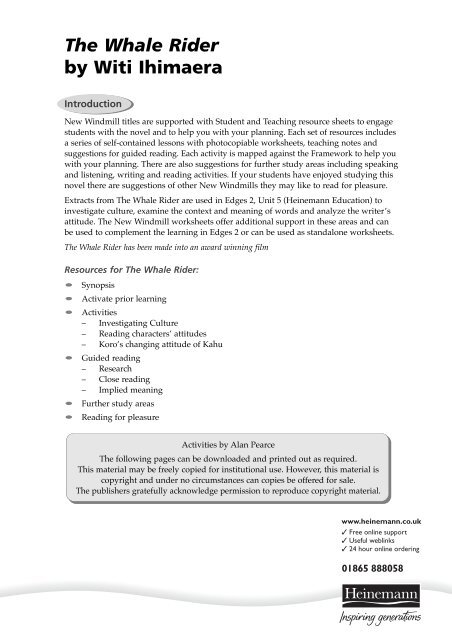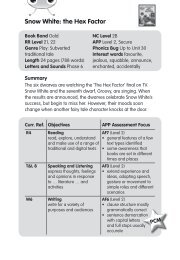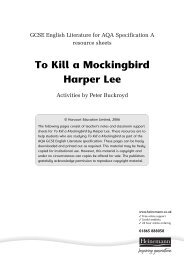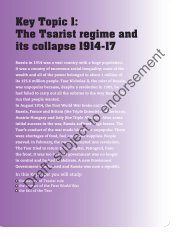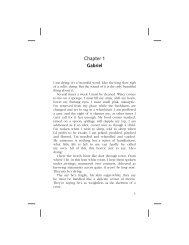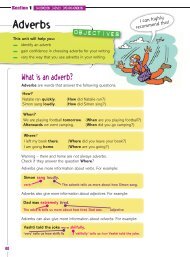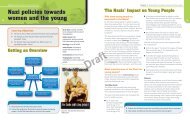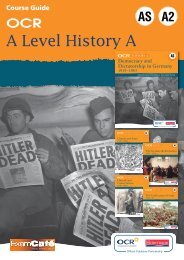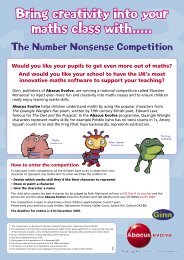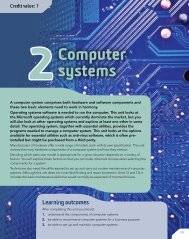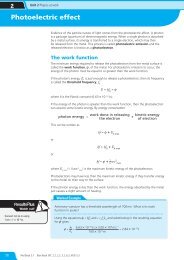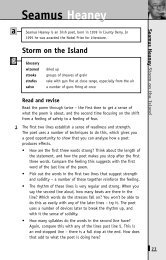The Whale Rider worksheets - Pearson Schools
The Whale Rider worksheets - Pearson Schools
The Whale Rider worksheets - Pearson Schools
Create successful ePaper yourself
Turn your PDF publications into a flip-book with our unique Google optimized e-Paper software.
<strong>The</strong> <strong>Whale</strong> <strong>Rider</strong><br />
by Witi Ihimaera<br />
Introduction<br />
New Windmill titles are supported with Student and Teaching resource sheets to engage<br />
students with the novel and to help you with your planning. Each set of resources includes<br />
a series of self-contained lessons with photocopiable <strong>worksheets</strong>, teaching notes and<br />
suggestions for guided reading. Each activity is mapped against the Framework to help you<br />
with your planning. <strong>The</strong>re are also suggestions for further study areas including speaking<br />
and listening, writing and reading activities. If your students have enjoyed studying this<br />
novel there are suggestions of other New Windmills they may like to read for pleasure.<br />
Extracts from <strong>The</strong> <strong>Whale</strong> <strong>Rider</strong> are used in Edges 2, Unit 5 (Heinemann Education) to<br />
investigate culture, examine the context and meaning of words and analyze the writer’s<br />
attitude. <strong>The</strong> New Windmill <strong>worksheets</strong> offer additional support in these areas and can<br />
be used to complement the learning in Edges 2 or can be used as standalone <strong>worksheets</strong>.<br />
<strong>The</strong> <strong>Whale</strong> <strong>Rider</strong> has been made into an award winning film<br />
Resources for <strong>The</strong> <strong>Whale</strong> <strong>Rider</strong>:<br />
Synopsis<br />
Activate prior learning<br />
Activities<br />
– Investigating Culture<br />
– Reading characters’ attitudes<br />
– Koro’s changing attitude of Kahu<br />
Guided reading<br />
– Research<br />
– Close reading<br />
– Implied meaning<br />
Further study areas<br />
Reading for pleasure<br />
Activities by Alan Pearce<br />
<strong>The</strong> following pages can be downloaded and printed out as required.<br />
This material may be freely copied for institutional use. However, this material is<br />
copyright and under no circumstances can copies be offered for sale.<br />
<strong>The</strong> publishers gratefully acknowledge permission to reproduce copyright material.
2<br />
Teacher’s<br />
Notes<br />
Synopsis<br />
<strong>The</strong> <strong>Whale</strong> <strong>Rider</strong><br />
<strong>The</strong> Whangara tribe (a Maori tribe in New Zealand) is traditionally led by a male.<br />
However, this tradition is put under threat when first-born great grandchild, Kahu, is a<br />
girl. Koro, her great grandfather, and chief of the tribe is devastated, and rejects the<br />
loving attention of Kahu.<br />
<strong>The</strong> Whangara tribe are proud of their traditions and history, and Koro teaches the<br />
youngsters about their past. <strong>The</strong> tribe believe that they are descendants of Paikea who<br />
escaped drowning by riding to dry land on the back of a whale. <strong>The</strong>y are concerned<br />
about their future without a male leader, although the reader is left confident that Kahu<br />
has, in some mysterious way, been selected to lead her people.<br />
Kahu has an extremely close relationship with her uncle, and the narrator of the story,<br />
Rawiri. Rawiri feels obliged to leave the village to broaden his experiences, but the draw<br />
of the tribe is too great and he returns, to experience Kahu’s love, and to witness Koro’s<br />
continued contempt for Kahu.<br />
<strong>The</strong> tribe face a crisis when over two hundred whales beach themselves at Whangara.<br />
<strong>The</strong> tribe battle to save the whales, but gradually all of the whales die. However, this<br />
event is followed by the arrival of a spiritual, tattooed whale which forced itself onto the<br />
beach. <strong>The</strong> tribe believe that their destiny depends on their ability to save this spiritual<br />
whale. <strong>The</strong> men of the tribe fail, and so call for the help of the women, but they only<br />
partially succeed. Finally, Kahu swims out to the whale, boards its back and encourages it<br />
to swim back out to sea.<br />
<strong>The</strong> whale, Kahu and the tribe all understand that Kahu is the chosen one, the one to lead<br />
the tribe successfully into the future. Even Koro is repentant enough to graciously accept<br />
Kahu.<br />
Activate prior learning<br />
<strong>The</strong> novel is based on Maori culture, and uses a wide range of Maori vocabulary. Elicit<br />
from students what they know about New Zealand and whether they know anything<br />
about the Maoris (Some may be familiar, for example, with the Rugby Team). It would be<br />
helpful if the students had some background information about Maori history. <strong>The</strong>re are<br />
many websites that provide information about Maori culture, and it is possible to find an<br />
online Maori/English translator. Go to http://www.heinemann.co.uk/hotlinks and type<br />
in express code 1087P.<br />
© Harcourt Education Limited, 2005
3<br />
Teacher’s<br />
Notes<br />
Teaching notes<br />
Activity 1: Investigating culture<br />
Framework Objectives<br />
<strong>The</strong> <strong>Whale</strong> <strong>Rider</strong><br />
Year 7: R2 Use appropriate reading strategies; R6 Adopt active reading strategies;<br />
Wr11 Select and present information using detail, example, diagram and illustration<br />
as appropriate<br />
Year 8: R2 Undertake independent research; Wr10 Organise and present information,<br />
selecting and synthesising appropriate material and guiding the reader clearly<br />
through the text, e.g. a technological process, an information leaflet<br />
Year 9: Wr3 Write in Standard English; R2 Synthesize information from a range of<br />
sources; Wr9 Integrate diverse information into a coherent and comprehensive<br />
account.<br />
Activity aims:<br />
To research relevant information.<br />
To produce an informative leaflet.<br />
This activity asks the students to explore Maori culture and to produce an informative<br />
leaflet.<br />
Provide the students with Resource Sheet 1. <strong>The</strong> students are asked to read two extracts<br />
carefully, one piece of non-fiction and one piece from the novel. <strong>The</strong> students are asked to<br />
summarize the <strong>Whale</strong> <strong>Rider</strong> story, combining information from the two sources in exactly<br />
one hundred words. <strong>The</strong>y are asked to imagine that their account is to be recounted<br />
orally to a group of Maori children; consequently, the students might need some help in<br />
making their account interesting for a listening audience.<br />
Provide the students with Resource Sheet 2. <strong>The</strong> students are asked to research specific<br />
aspects of Maori life and to produce an informative leaflet. <strong>The</strong> students are likely to use<br />
the categories suggested on the Resource Sheet as key words for an Internet search.<br />
However, the school library might have other relevant information. Edges 2, Unit 5,<br />
which includes extracts from <strong>The</strong> <strong>Whale</strong> <strong>Rider</strong>, also includes work on how to research texts<br />
for information. <strong>The</strong> students are asked to consider the following when they use the<br />
information they find to write a leaflet:<br />
What sections will you have?<br />
Will you use illustrations?<br />
Will you use headings and sub-headings?<br />
Would bullet points be appropriate?<br />
Above all, will your writing style be appropriate for readers of your own age?<br />
© Harcourt Education Limited, 2005
4<br />
Teacher’s<br />
Notes<br />
It might be necessary to remind the students that leaflets are conventionally written in a<br />
formal style. This particular leaflet will be written in a mixture of present and past tense:<br />
present tense for the things that Maoris do now; past tense for historical details about the<br />
Maoris. It is important, however, to stress to the students that the leaflet will be written<br />
for students of their own age, and so the language used in their leaflets needs to be<br />
appropriate for their target audience. It will not be appropriate to just copy material from<br />
websites.<br />
Some helpful websites can be found at http://www.heinemann.co.uk/hotlinks, express<br />
code 1087P.<br />
Students who might need more support with the research skills needed for this activity<br />
would benefit form the guided reading activity detailed below.<br />
Guided reading – Research<br />
<strong>The</strong> <strong>Whale</strong> <strong>Rider</strong><br />
Activity 1 asks the students to produce a leaflet that provides information about Maori<br />
culture. It asks the students to research and present information from four of the<br />
following categories:<br />
Maori culture and traditions<br />
Maori art<br />
the Maori wars<br />
Maori legends<br />
Maori religion and Gods<br />
the Maori language<br />
Maoris today.<br />
Select a group of students who would benefit from some help with using the Internet to<br />
research information. Choose one of the categories, and show the students how a Boolean<br />
search works (Place two search words, plus the word ‘and’: Maori and legends.) Explain<br />
how this will ensure that all sources identified will have both Maori and legends in them.<br />
Without ‘and’ the search would identify all sources with ‘Maori’ in them plus all sources<br />
with ‘legends’ in them. Explore what happens when you place Maori or art into a search<br />
engine. Also, explore what happens when you place parentheses around Maori art:<br />
‘Maori art’.<br />
It is important to be aware that different search engines operate in slightly different ways<br />
and so will respond in different ways to the options explored above.<br />
© Harcourt Eduction Limited, 2005
5<br />
1<br />
Student<br />
Sheet<br />
Introduction<br />
Investigating Culture<br />
<strong>The</strong> <strong>Whale</strong> <strong>Rider</strong><br />
Maoris have a number of legends that explain aspects of their past. <strong>The</strong>se legends are<br />
passed down from generation to generation by tribal leaders or priests. One such legend<br />
is the story of Paikea.<br />
Activity<br />
Carefully read the two extracts below. One extract comes from the prologue to the<br />
novel <strong>The</strong> <strong>Whale</strong> <strong>Rider</strong>. <strong>The</strong> other extract comes from a reference book about Maori<br />
culture. Imagine that you are a Maori tribal leader. Your task is to take information from<br />
each of the extracts, and to combine this information to create the story of Paikea. You<br />
are going to tell the story to a group of young Maori children, so you will have to make<br />
it interesting. However, because your audience is young children you have decided that<br />
the story cannot be too long. Consequently, you have given yourself the target of telling<br />
the story in exactly one hundred words.<br />
Source 1: From <strong>The</strong> <strong>Whale</strong> <strong>Rider</strong>: <strong>The</strong> Prologue<br />
A whale, gigantic. A sea monster. Just as it burst through the sea, a flying fish<br />
leaping high in its ecstasy saw water and air streaming like thunderous foam from<br />
that noble beats and knew, ah yes, that the time had come. For the sacred sign was<br />
on the monster, a swirling tattoo imprinted on the forehead.<br />
<strong>The</strong>n the flying fish saw that astride the head, as it broke skyward, was a man.<br />
He was wondrous to look upon, the whale rider. <strong>The</strong> water streamed away from him<br />
and he opened his mouth to gasp in the cold air. His eyes were shining with<br />
splendour. His body dazzled with diamond spray. Upon that beast he looked like a<br />
small tattooed figurine, dark brown, glistening and erect. He seemed, with all his<br />
strength, to be pulling the whale into the sky.<br />
Page 4<br />
Source 2: From Maori Legends<br />
<strong>The</strong> Legend of Paikea<br />
Paikea is the Polynesian god of sea monsters. <strong>The</strong> name is also used to refer to the<br />
mythical person who began the Ngati Porou tribe in Whangara on the East Coast of<br />
Aotearoa. Maori legend has it that Paikea came from Hawaiki to Whangara, riding<br />
on the back of a taniwha. He had escaped drowning when his whaka capsized.<br />
© Harcourt Education Limited, 2005
6<br />
2 Investigating Culture<br />
Student<br />
Sheet<br />
Introduction<br />
Most people in Britain know very little about the Maoris. We might know that they<br />
come from New Zealand, and we might have seen the haka, the Maori war dance that<br />
is always demonstrated by the All Blacks rugby team before a game. It is difficult to fully<br />
appreciate the novel <strong>The</strong> <strong>Whale</strong> <strong>Rider</strong> without knowing something about Maori culture.<br />
Activity<br />
<strong>The</strong> <strong>Whale</strong> <strong>Rider</strong> was first published in New Zealand in 1987, and in 2003 it was made<br />
into a film. It has now been published by Heinemann in Britain in 2005. British readers<br />
will be fascinated by the insight they get into Maori culture, but will want to know even<br />
more. Imagine that Heinemann would like to provide students with some background<br />
information about Maori culture. <strong>The</strong>y have given you the following task:<br />
1 Produce a leaflet that provides some background information about Maori culture.<br />
2 <strong>The</strong> leaflet should be written for students in Years 7, 8 and 9.<br />
3 At least three of the following areas of information should be covered:<br />
Maori culture and traditions<br />
Maori art<br />
the Maori wars<br />
Maori legends<br />
Maori religion and Gods<br />
the Maori language<br />
Maoris today.<br />
You will be able to obtain some information from <strong>The</strong> <strong>Whale</strong> <strong>Rider</strong>. You will also be able<br />
to find information in reference books, such as an encyclopedia. In addition, there are<br />
some very helpful websites.<br />
Notes<br />
Think about the presentation of your leaflet:<br />
What sections will you have?<br />
Will you use illustrations?<br />
Will you use headings and sub-headings?<br />
Would bullet points be appropriate?<br />
<strong>The</strong> <strong>Whale</strong> <strong>Rider</strong><br />
Above all, will your writing style be appropriate for readers of your own age?<br />
© Harcourt Eduction Limited, 2005
7<br />
Teacher’s<br />
Notes<br />
Teaching notes<br />
Activity 2: Reading characters’ attitudes<br />
Framework Objectives<br />
Year 7: W14 Define and deploy words with precision; W15 Use a dictionary with<br />
precision; R2 Use appropriate reading strategies; R4 Make brief notes;<br />
Wr10 Organise texts appropriately; Wr11 Select and organise information.<br />
Year 8: W14 Collect and comment on language change; R1 Combine information<br />
from various sources; R2 Undertake independent research using ICT databases;<br />
Wr10 Organise and present information.<br />
Year 9: S8 Investigate the conventions of ICT texts; R2 Synthesise information from a<br />
range of sources; R3 Improve note-taking; Wr4 Choose a range of presentational<br />
devices; Wr9 Integrate diverse information.<br />
Activity aims:<br />
To engage in close reading of an extract from the novel.<br />
To respond to a writer’s use of language.<br />
<strong>The</strong> <strong>Whale</strong> <strong>Rider</strong><br />
This activity asks the students to engage in some close reading in order to explore<br />
characters’ attitudes towards events.<br />
Provide the students with Resource Sheet 3. <strong>The</strong> students are asked to read an extract<br />
from <strong>The</strong> <strong>Whale</strong> <strong>Rider</strong>, and then respond to a series of questions about the extract. <strong>The</strong>se<br />
questions ask the students for their own response to the text, and so there are no correct<br />
answers. However, if students need some prompts the following notes might be helpful:<br />
1 Why do you think Nani is crying? ‘I think that she is crying out of happiness. I think this<br />
because we know that she is delighted that she has a great granddaughter.’<br />
2 When Nani tells the boys that they have a beautiful niece, what mood do you think<br />
she is in? ‘I think that she is extremely proud, because she says the baby must be beautiful it<br />
looks like her.’<br />
3 Why do you think the boys tried not to laugh? ‘Because Nani was not pretty, and so Nani is<br />
actually implying that the baby is ugly.’<br />
4 When Nani called to Koro, her voice ‘boomed’. What does that suggest about the<br />
mood she is in? ‘We are told afterwards that Nani called Koro an old paka, a term she used<br />
when she was being affectionate. Consequently, the ‘boom’ in her voice suggests how excited she is –<br />
we often raise our voice when we are excited.’<br />
5 What does the verb ‘jumped’ suggest about Koro? ‘Koro probably ‘jumped’ into the boat<br />
because he was desperate to get away. He was disappointed that he did not have a grandson, and<br />
was probably angry about all the celebrations when he was so disappointed.’<br />
6 We know that Nani is angry. So, what does the verb ‘muttered’ suggest? ‘This suggests<br />
that she is plotting a way to get back at Koro.’<br />
© Harcourt Eduction Limited, 2005
8<br />
Teacher’s<br />
Notes<br />
Provide the students with Resource Sheet 4.<br />
<strong>The</strong> students are asked to read an extract from <strong>The</strong> <strong>Whale</strong> <strong>Rider</strong>, and then respond to a<br />
series of questions about the language used in the extract. This activity is different to the<br />
activity presented in Resource Sheet 3 because it requires much more sensitive response to<br />
the language; the students are asked to respond at a more implicit level. Students might<br />
need to be helped to read beyond the literal meanings of the words in order to speculate<br />
on the writer’s intentions. While the students are asked to respond personally to the<br />
passage, and consequently there are no correct answers, the following responses might be<br />
helpful if the teacher needs to prompt students who are finding any of the text difficult.<br />
1 Does the verb ‘weeping’ have a different effect than ‘crying’ would? Although both<br />
words, ‘weeping’ and ‘crying’, would show that Kahu is upset, I think that ‘weeping’ makes Kahu sound<br />
very young, and vulnerable. <strong>The</strong> word ‘weeping’ helps us to sympathise with her, because she is upset.<br />
2 What impression of Kahu do we get here? Kahu seems to be absolutely devastated, and is<br />
seeking some human support. She is almost acting like a little child ands so we get the impression<br />
that she is extremely vulnerable at this point. It is also clear that Kahu feels an intimate affinity with<br />
the whales.<br />
3 ‘Mewling’ is an unusual word. What is the writer trying to suggest about Kahu and<br />
her relationship with the whales? <strong>The</strong> term ‘mewling’ comes from Shakespeare’s Seven Ages<br />
of Man speech in As You Like It. It is a term used to describe the crying of a young child. It means<br />
to cry weakly. However, the term ‘mewling’ is also used to describe the sound that killer whales make<br />
when they congregate. Consequently, the term when applied to Kahu suggests both her desperation,<br />
and her affinity with the whales.<br />
4 What is suggested about Kahu’s feelings by the verb ‘wrenched’? Wrenching is a<br />
forceful, twisting movement. This first shows that Kahu had been supported very tightly. However,<br />
more importantly, her violent movement shows how angry or upset she is.<br />
5 This is a powerful sentence. What points can you make about it? <strong>The</strong> sentence is a very<br />
brief sentence: ‘No, Paka, no!’ she screamed. <strong>The</strong> exclamation mark shows how angry she is, as does<br />
the very abrupt utterance. <strong>The</strong> repetition of ‘no’ makes it very insistent, while the inclusion of ‘Paka’<br />
makes the utterance sound like a very personal plea to her grandfather. <strong>The</strong> verb ‘screamed’<br />
emphasizes how distraught she is, and how immediate she wants her grandfather’s response to be.<br />
However, from the context of the novel, it is not clear what response Kahu wanted. <strong>The</strong> grandfather<br />
was only relating a story from his childhood, not stating contemporary Maori values.<br />
Guided reading – Close Reading<br />
Activity 2 asks the students to read an extract from <strong>The</strong> <strong>Whale</strong> <strong>Rider</strong> and consider the<br />
character’s attitude. This essentially requires that the students engage in some close reading.<br />
Select a group of students who would benefit from support with close reading. Together<br />
read from the top of page 40 to ‘<strong>The</strong> rain fell like spears’ on page 41. Ask the students to<br />
explain how Koro felt as a seven year old experiencing his first whale hunt. For example, it<br />
would be possible to ask the students to respond to the following details from the extract:<br />
a whaling was one of the great pastimes<br />
b you’d see all the whaling boats tearing out to sea<br />
c <strong>The</strong>y were the most beautiful sight I had ever seen<br />
d I ran down past the sheds<br />
e <strong>The</strong>n the harpoons began to sing through the air<br />
<strong>The</strong> <strong>Whale</strong> <strong>Rider</strong><br />
© Harcourt Eduction Limited, 2005
9<br />
3 Reading characters’ attitudes<br />
Student<br />
Sheet<br />
When we read a novel we respond to the way the characters feel about events. To do<br />
this we think very carefully about the writer’s use of words. Sometimes we are told<br />
exactly what a character feels, while at other times we have to make our own<br />
judgements from the evidence.<br />
Look at the passage below. Nani is just receiving a ‘phone call from her grandson to tell<br />
her that she has a great granddaughter. In the boxes around the passage answer the<br />
questions. Sometimes this will be very easy. At other times you have to make your own<br />
mind up from what has been written. If you can, explain how you have come up with<br />
your answer. You will notice that one of the boxes has been filled in for you.<br />
Why do you think<br />
Nani is crying?<br />
‘I think that she is<br />
crying out of happiness.<br />
I think this because we<br />
know that she is<br />
delighted that she has<br />
a great granddaughter.’<br />
Why do you think the<br />
boys tried not to<br />
laugh?<br />
We know that Nani is<br />
angry. So, what does<br />
the verb ‘muttered’<br />
suggest?<br />
Page 11<br />
Next minute the tears started rolling down the old<br />
lady’s face. ‘What’s that, dear? Oh, the poor thing.<br />
Oh the poor thing. Oh the poor thing. Oh. Oh. Oh.<br />
Well you tell Rehu that the first is the worst. <strong>The</strong><br />
others come easier because by then she’ll have the<br />
hang of it. Yes, dear. I’ll tell him. Yes, don’t you<br />
worry. Yes. All right. Yes, and we love you too.’<br />
She put down the phone. ‘Well, Rawiri,’ she said to<br />
me, ‘you and the boys have got a beautiful niece.<br />
She must be, because Porourangi said she looks<br />
just like me.’ We tried not to laugh, because Nani<br />
was no film star. <strong>The</strong>n, all of a sudden, she put her<br />
hands on her hips and made her face grim and went<br />
to the front verandah. Far away, down on the<br />
beach, old Koro Apirana was putting his rowboat<br />
onto the afternoon sea. Whenever he felt angry he<br />
would always get on his rowboat and row out into<br />
the middle of the ocean to sulk.<br />
‘Hey,’ Nani Flowers boomed, ‘you old paka,’<br />
which was the affectionate name she always called<br />
our Koro when she wanted him to know she loved<br />
him. ‘Hey!’ But he pretended he didn’t hear her<br />
calling him an old bugger, jumped into the<br />
rowboat, and made out to sea.<br />
Well, that did it. Nani Flowers got her wild up.<br />
‘Think he can get away from me, does he?’ she<br />
muttered. ‘Well he can’t.’<br />
<strong>The</strong> <strong>Whale</strong> <strong>Rider</strong><br />
© Harcourt Eduction Limited, 2005<br />
When Nani tells the<br />
boys that they have a<br />
beautiful niece, what<br />
mood do you think<br />
she is in?<br />
When Nani called to<br />
Koro, her voice<br />
‘boomed’. What does<br />
that suggest about<br />
the mood she is in?<br />
What does the verb<br />
‘jumped’ suggest<br />
about Koro?
10<br />
4 Reading characters’ attitudes<br />
Student<br />
Sheet<br />
When we read a novel we respond to the way the characters feel about events. To do<br />
this we think very carefully about the writer’s use of words. Sometimes we are told<br />
exactly what a character feels, while at other times we have to make our own<br />
judgements from the evidence. In this activity you need to look beyond the literal<br />
meanings of the words, and try to work out what the writer might have been trying to<br />
achieve. <strong>The</strong>re are no correct answers to any of these questions.<br />
Re-read the passage below. Koro is telling the young boys of the tribe about his first<br />
whale hunt, when he was only seven years’ old. However, Kahu is outside the room, and<br />
is listening to what Koro is saying. In the box below the passage there are some<br />
quotations from the passage. Your task is to explain what each of the quotations<br />
suggests to you about Kahu’s feelings. Notice that there is a response to one of the<br />
quotations.<br />
Koro Apirana led us in a prayer to bless the school. <strong>The</strong>n, after the<br />
introductions, he told us of the times which had brought the silence to the sea.<br />
‘I was a boy of seven years’ age,’ he began, ‘when I went to stay with my uncle<br />
who was a whaler. I was too young to know any better, and I didn’t understand then,<br />
as I do now, about our ancestor, the whale. At that time whaling was one of the great<br />
pastimes and once the bell on the lookout had been sounded you’d see all the<br />
whaling boats tearing out to sea, chasing after a whale. Doesn’t matter what you<br />
were doing, you’d drop everything, your plough, your sheep clippers, your<br />
schoolbooks, everything. I can still remember seeing everyone climbing the lookout,<br />
like white balloons. I followed them and far out to sea I saw a heard of whales.’<br />
<strong>The</strong> rain fell through his words. ‘they were the most beautiful sight I had ever<br />
seen.’ He made a sweeping gesture. ‘<strong>The</strong>n, down by the slipway, I could see the<br />
longboats being launched into the sea. I ran down past the sheds, and the pots on the<br />
fires were already being stoked to boil down the blubber. All of a sudden my uncle<br />
yelled out to me to get on his boat with him. So there I was, heading out to sea.’<br />
I saw a spiky head sneaking a look through the door. ‘That’s when I saw the<br />
whales really close,’ Koro Apirana said. ‘<strong>The</strong>re must have been sixty of them at<br />
least. I have never forgotten, never. <strong>The</strong>y had prestige. <strong>The</strong>y were so powerful. Our<br />
longboat got so close to one that I was able to reach out and touch the skin.’ His<br />
voice was hushed with awe. I felt the ripple of power beneath the skin. It felt like<br />
silk. Like a god. <strong>The</strong>n the harpoons began to sing through the air. But I was young,<br />
you see, and all I could feel was the thrill, like when you do a haka.’<br />
Page 40<br />
<strong>The</strong> <strong>Whale</strong> <strong>Rider</strong><br />
© Harcourt Eduction Limited, 2005
11<br />
4<br />
Student<br />
Sheet<br />
He paused, mesmirised. ‘I can remember that<br />
when a whale was harpooned it would fight with all<br />
its strength. Eventually it would spout blood like a<br />
fountain, and the sea would be red. Three or four<br />
other boats would tow it ashore to the nearest place<br />
and cut it up and share out the meat and the oil and<br />
everything. When we started to strip the blubber off<br />
the whale in the whaling station, all the blood flowed<br />
into the channel. Blind eels would come up with the<br />
tide to drink the blood.<br />
I heard Kahu weeping at the doorway. I edged<br />
over to her and when she saw me she put her arms<br />
around my neck.<br />
‘You better go home,’ I whispered, ‘before Koro<br />
Apirana finds out you’re here.’<br />
But she was so frightened. She was making a<br />
mewling sound in her throat. She seemed paralysed<br />
with terror.<br />
Inside, Koro Apirana was saying, ‘When it was<br />
all finished we would cut huge slabs of whale meat<br />
and sling them across our horses and take them to<br />
our homes–’<br />
Suddenly, before I could stop her, Kahu wrenched<br />
away from me and ran into the meeting house.<br />
‘No, Paka, no!’ she screamed.<br />
His mouth dropped open. ‘Haere atu koe!<br />
Get away from here,’ he shouted.<br />
‘Paka, Paka, no!’<br />
Grimly, Koro Apirana walked up to her, took her<br />
by the arms and virtually hurled her out. ‘Go. Get<br />
away from here,’ he repeated. <strong>The</strong> sea thundered<br />
ominously. <strong>The</strong> rain fell like spears.<br />
Pages 40–41<br />
<strong>The</strong> <strong>Whale</strong> <strong>Rider</strong><br />
Does the verb ‘weeping’<br />
have a different effect than<br />
‘crying’ would?<br />
Although both words, ‘weepy’<br />
and ‘crying’, would show that<br />
Kahu is upset, I think that<br />
‘weepy’ makes Kahu sound<br />
very young, and vulnerable.<br />
<strong>The</strong> word ‘weepy’ helps us to<br />
sympathise with her, because<br />
she is upset<br />
What impression of Kahu do<br />
we get here?<br />
‘Mewling’ is an unusual<br />
word. What is the writer<br />
trying to suggest about<br />
Kahu and her relationship<br />
with the whales?<br />
What is suggested about<br />
Kahu’s feelings by the verb<br />
‘wrenched’?<br />
This is a powerful sentence.<br />
What points can you make<br />
about it?<br />
© Harcourt Eduction Limited, 2005
12<br />
Teacher’s<br />
Notes<br />
Teaching notes<br />
Activity 3: Koro’s changing attitude of Kahu<br />
Framework Objectives<br />
<strong>The</strong> <strong>Whale</strong> <strong>Rider</strong><br />
Year 7: R6 Actively read for information; R8 Infer and deduce information;<br />
R16 Distinguish between the attitudes of characters and author; Wr19 Write<br />
reflectively about a text, taking account of the needs of others who might read it.<br />
Year 8: R4 Read actively for meaning; Wr6 Convey a sense of character in writing;<br />
Wr18, Write a critical review of a substantial text, taking account of the context in<br />
which it was written and the likely impact on its intended readers.<br />
Year 9: R5 Evaluate their own critical writing about texts; R6 Comment on the<br />
authorial perspectives offered in texts on individuals, community and society in<br />
texts from different cultures; Wr17 Cite specific and relevant textual evidence to<br />
justify critical judgements about texts<br />
Activity aims:<br />
To respond to the writer’s use of language.<br />
To produce a piece of analytical writing.<br />
This activity asks the students to produce a piece of analytical writing, tracing Koro’s<br />
changing relationship with his great grand-daughter. <strong>The</strong> students are encouraged to use<br />
textual evidence to support their points of view.<br />
Provide the students with Resource Sheet 5. <strong>The</strong> students are lead through an example of<br />
how to use textual evidence to support a point of view. <strong>The</strong> students are asked to<br />
respond personally to the writer’s use of language, and consequently there are no correct<br />
answers. However, the teacher might find the following notes helpful if they are required<br />
to prompt students who find this activity difficult.<br />
Extract 1<br />
On Kahu’s part, when she first met Koro Apirana, it must have been love at first sight<br />
because she dribbled all over him. Porourangi had walked through the door with his<br />
daughter and Nani Flowers, cross-eyed with joy, had grabbed Kahu for a great big hug.<br />
<strong>The</strong>n she put Kahu in Koro Apirana’s arms before he could say ‘No.’ 1<br />
‘Oh no,’ Koro Apirana said. 2<br />
‘A little dribbling never hurt anybody,’ Nani Flowers scoffed.<br />
‘That’s not the end I’m worried about,’ he grumbled, 3 lifting up Kahu’s blankets.<br />
© Harcourt Eduction Limited, 2005
13<br />
Teacher’s<br />
Notes<br />
Extract 2<br />
Under these conditions, the love which Kahu received from Koro Apirana was the sort<br />
that dropped off the edge of the table, like the breadcrumbs after everybody else has had<br />
a big meal. 4 But Kahu didn’t seem to mind. She ran into Koro Apirana’s arms whenever<br />
he had time for her 5 and took whatever he was able to give.<br />
1 We can see here that Nani Flowers expected Koro to be rude about Kahu. Obviously<br />
Koro had already made his feelings clear about having a granddaughter.<br />
2 Very few great grandfathers would be upset just because their new great<br />
granddaughter had dribbled on them. This public display of anger shows how<br />
disappointed Koro was, and also how selfish he is, making his feelings clear.<br />
3 Koro’s grumbling shows that he has continued to express his disappointment. <strong>The</strong><br />
fact that he has checked Kahu’s nappy shows that he is only thinking about himself.<br />
4 This metaphor suggests that (a) there is very little love, (b) that any love that there is,<br />
is almost accidental, and (c) the child needs the love in order to survive.<br />
5 This illustrates (a) how much Kahu loved her great grandfather, even though he was<br />
so dismissive of her, but also that (b) there were odd moments when Koro forgot<br />
about his disappointment, and showed some affection for his great granddaughter.<br />
Provide the students with Resource Sheet 6. <strong>The</strong> students are asked to produce a piece of<br />
analytical writing, to consider Koro’s changing attitude towards Kahu. Apposite<br />
quotations are provided and the students are provided with prompts to help them see<br />
why these quotations are important.<br />
If students are not confident about analytical writing they will require a great deal of<br />
support with this activity. For example, the students might require some support with the<br />
opening paragraph which will provide an outline of the students’ argument. <strong>The</strong>y might<br />
also require help to insert quotations into an essay and then discuss their significance.<br />
Finally, students might need help to use connectives in order to link their ideas and their<br />
paragraphs in a logical manner.<br />
It might be helpful to use the guided reading activity to support weaker students before<br />
they carry out this activity<br />
Guided reading – Implied meaning<br />
<strong>The</strong> <strong>Whale</strong> <strong>Rider</strong><br />
Activity 3 asks the students to produce a piece of analytical writing which explores<br />
Koro’s changing attitudes towards Kahu. At the planning stage of the essay the students<br />
are asked to respond to a series of quotations. <strong>The</strong> following quotations are provided,<br />
with questions to encourage the students to think about the implied meaning behind the<br />
quotations.<br />
© Harcourt Eduction Limited, 2005
14<br />
Teacher’s<br />
Notes<br />
Page Quotation Comment<br />
12<br />
30<br />
41<br />
65<br />
67–8<br />
98–9<br />
107<br />
117<br />
120<br />
121<br />
<strong>The</strong> trouble was that Koro Apirana<br />
could not reconcile his traditional<br />
beliefs about Maori leadership and<br />
rights with Kahu’s birth.<br />
‘Go away,’ Koro Apirana would<br />
thunder.<br />
‘Go. Get away from here,’ he<br />
repeated.<br />
‘Go back,’ he said. ‘Go away. You are<br />
of no use to me.’<br />
For the rest of that evening the seat<br />
beside Nani Flowers remained<br />
empty, like a gap in a row of teeth.<br />
‘When it dies, we die. I die.’<br />
‘No, Paka. And if it lives?’<br />
‘<strong>The</strong>n we live also.’<br />
<strong>The</strong> old man understood. He raised<br />
his arms as if to claw down the sky<br />
upon him.<br />
‘I should have known that she was<br />
the one,’ Koro Apirana said.<br />
Oh, yes, grandchild. Rise up from<br />
the depths of your long sleep.<br />
Return to the people and take your<br />
rightful place among them.<br />
‘You’re the best grandchild in the<br />
whole wide world,’ he said. ‘Boy or<br />
girl, it doesn’t matter.’<br />
<strong>The</strong> <strong>Whale</strong> <strong>Rider</strong><br />
This is the key problem for Koro.<br />
However, what is the problem?<br />
How old was Kahu at this time?<br />
What effect does the verb ‘thunder’<br />
have?<br />
How old was Kahu at this time?<br />
What effect is created by having the<br />
word ‘Go’ on its own in a sentence?<br />
What is Koro referring to when he<br />
says that Kahu is ‘of no use’? Do<br />
you think this is a cruel thing to say?<br />
This describes the empty seat during<br />
the end of school concert. What does<br />
the simile ‘like a gap in a row of<br />
teeth’ suggest about Koro’ absence?<br />
Why is this brief conversation<br />
between Koro and Kahu relevant for<br />
your essay?<br />
We can see a change in Koro’s<br />
attitude towards Kahu. What has<br />
Koro understood? What does the<br />
simile ‘as if to claw down the sky<br />
upon him’ have?<br />
What does Koro mean when he says<br />
‘She is the one’? For what?<br />
What does Koro mean when he<br />
refers to ‘your rightful place’?<br />
How does this comment relate back<br />
to the quotation from page 12, at the<br />
top of this table?<br />
Select a group of students who would benefit from some support with responding to<br />
implied meaning. First of all, explain the difference between explicit meaning and<br />
implied meaning. Next, choose one or two of the quotations from the table. Re-read the<br />
pages on which the quotations appear, in order to put the quotations into context. <strong>The</strong>n<br />
ask the students the questions for these quotations that appear in the table. Encourage the<br />
students to explain their responses by referring closely to the language of the quotations.<br />
© Harcourt Eduction Limited, 2005
15<br />
5<br />
Student<br />
Sheet<br />
<strong>The</strong> <strong>Whale</strong> <strong>Rider</strong><br />
Koro’s changing impression of<br />
Kahu<br />
When Kahu is born, Koro is deeply disappointed because tradition says that the<br />
leadership of the tribe must be passed on to a male. Koro is cruel to Kahu, turning her<br />
away whenever she expresses her love for Koro.<br />
Carefully re-read the extracts below from <strong>The</strong> <strong>Whale</strong> <strong>Rider</strong>. You will notice that some of<br />
the phrases are underlined. Your task is to use the boxes to write down what you think<br />
each of the quotations tells us about Koro’s feelings for Kahu. You will notice that one<br />
of the boxes has been completed as an example.<br />
Extract 1<br />
On Kahu’s part, when she first met Koro<br />
Apirana, it must have been love at first sight<br />
because she dribbled all over him. Porourangi had<br />
walked through the door with his daughter and Nani<br />
Flowers, cross-eyed with joy, had grabbed Kahu for<br />
a great big hug. <strong>The</strong>n she put Kahu in Koro<br />
Apirana’s arms before he could say ‘No.’<br />
‘Oh no,’ Koro Apirana said.<br />
‘A little dribbling never hurt anybody,’ Nani<br />
Flowers scoffed.<br />
‘That’s not the end I’m worried about,’ he<br />
grumbled, lifting up Kahu’s blankets.<br />
Page 25<br />
Extract 2<br />
Under these conditions, the love which Kahu<br />
received from Koro Apirana was the sort that<br />
dropped off the edge of the table, like the<br />
breadcrumbs after everybody else has had a big<br />
meal. But Kahu didn’t seem to mind. She ran into<br />
Koro Apirana’s arms whenever he had time for her<br />
and took whatever he was able to give.<br />
Page 36–7<br />
This phrase shows that Nani<br />
expected Koro to be reluctant to hold<br />
the baby, and so she gave it to him<br />
quickly. She must have expected Koro<br />
to be reluctant because he had<br />
already told Nani how disappointed<br />
he was that Kahu was a girl.<br />
© Harcourt Eduction Limited, 2005
16<br />
6<br />
Student<br />
Sheet<br />
Introduction<br />
<strong>The</strong> <strong>Whale</strong> <strong>Rider</strong><br />
Koro’s feelings towards Kahu<br />
When Kahu is born, Koro is deeply disappointed because tradition says that the<br />
leadership of the tribe must be passed on to a male. Koro is cruel to Kahu, turning her<br />
away whenever she expresses her love for Koro. It is not until the end of the novel that<br />
Koro eventually realises how important Kahu is to the tribe. In fact by the end of the<br />
novel we can see that Koro actually has a great deal of respect for Kahu.<br />
Activity<br />
Your task is to produce a piece of analytical writing, which explores the way Koro feels<br />
about Kahu, his great granddaughter. You need to show how Koro dismissed Kahu for a<br />
long time, but eventually accepted her as the person who would secure the future of<br />
the tribe. You must make very close reference to the text in order to support your point<br />
of view.<br />
Planning<br />
Structure your essay so that you:<br />
First, write an introductory paragraph which outlines the change that takes place<br />
in Koro’s attitude towards Kahu.<br />
Next, deal with the way Koro originally ignored Kahu, and was extremely rude<br />
to her.<br />
Afterwards, show how and why Koro’s attitude towards Kahu changed.<br />
Finally, sum up your ideas in a conclusion.<br />
<strong>The</strong> following quotations will be useful for your essay, but you will not want to use all of<br />
them. Only use the quotations that you think are the most useful. You will notice that<br />
for each quotation there are some notes which might help you to use the quotation in<br />
your essay.<br />
© Harcourt Eduction Limited, 2005
17<br />
6<br />
Student<br />
Sheet<br />
<strong>The</strong> <strong>Whale</strong> <strong>Rider</strong><br />
Koro’s feeling’s towards Kahu<br />
Page Quotation Comment<br />
12<br />
30<br />
41<br />
65<br />
67/8<br />
98/9<br />
107<br />
117<br />
120<br />
121<br />
<strong>The</strong> trouble was that Koro Apirana<br />
could not reconcile his traditional<br />
beliefs about Maori leadership and<br />
rights with Kahu’s birth.<br />
‘Go away,’ Koro Apirana would<br />
thunder.<br />
‘Go. Get away from here,’ he<br />
repeated.<br />
‘Go back,’ he said. ‘Go away. You<br />
are of no use to me.’<br />
For the rest of that evening the seat<br />
beside Nani Flowers remained<br />
empty, like a gap in a row of teeth.<br />
‘When it dies, we die. I die.’<br />
‘No, Paka. And if it lives?’<br />
‘<strong>The</strong>n we live also.’<br />
<strong>The</strong> old man understood. He raised<br />
his arms as if to claw down the sky<br />
upon him.<br />
‘I should have known that she was<br />
the one,’ Koro Apirana said.<br />
Oh, yes, grandchild. Rise up from<br />
the depths of your long sleep.<br />
Return to the people and take your<br />
rightful place among them.<br />
‘You’re the best grandchild in the<br />
whole wide world,’ he said. ‘Boy or<br />
girl, it doesn’t matter.’<br />
This is the key problem for Koro.<br />
However, what is the problem?<br />
How old was Kahu at this time?<br />
What effect does the verb ‘thunder’<br />
have?<br />
How old was Kahu at this time?<br />
What effect is created by having the<br />
word ‘Go’ on its own in a sentence?<br />
What is Koro referring to when he<br />
says that Kahu is ‘of no use’? Do you<br />
think this is a cruel thing to say?<br />
This describes the empty seat during<br />
the end of school concert. What<br />
does the simile ‘like a gap in a row of<br />
teeth’ suggest about Koro’ absence?<br />
Why is this brief conversation<br />
between Koro and Kahu relevant for<br />
your essay?<br />
We can see a change in Koro’s<br />
attitude towards Kahu. What has<br />
Koro understood? What does the<br />
simile ‘as if to claw down the sky<br />
upon him’ have?<br />
What does Koro mean when he says<br />
‘She is the one’? For what?<br />
What does Koro mean when he<br />
refers to ‘your rightful place’?<br />
How does this comment relate back<br />
to the quotation from page 12, at<br />
the top of this table?<br />
© Harcourt Eduction Limited, 2005
18<br />
Teacher’s<br />
Notes<br />
Further study areas<br />
While this novel is based in Maori culture, and deals with Maori mythology, it is still a<br />
novel about the relationships within a family.<br />
<strong>The</strong> following study areas provide ideal opportunities for creating interesting and<br />
stimulating activities:<br />
Author’s craft: Explore the use of two narrative perspectives. Most of the story is told<br />
by Rawiri, but some of the more fantastical content of the novel is presented in the<br />
third person.<br />
(Author’s craft: Yr7 R12; Yr8 R10; Yr9 R9)<br />
Analytical writing: Produce a piece of analytical writing which considers whether the<br />
women of the Whangara tribe are treated with the same respect as the men.<br />
(Analytical writing: Yr7 S13, Wr18; Yr8 S9, Wr16; Yr9 Wr16)<br />
Informative writing: Produce a piece of informative writing, exploring the culture within<br />
which the novel is set.<br />
(Informative writing: Yr7 S13; Yr8 S9, Wr10; Yr9 Wr9)<br />
Collaborative drama: Act out any of the conversations between key characters: Koro and<br />
Nani Flowers; Kahu and Rawiri; Kahu and Nani Flowers. <strong>The</strong> focus should be on<br />
maintaining character.<br />
(Collaborative drama: Yr7 S&L16; Yr8 S&L16; Yr9 S&L14)<br />
Independent research / Information writing: Research the social conditions of the Maori<br />
people over the last one hundred years. Produce a poster to illustrate what you discover.<br />
(Independent research: Yr7 R1, Wr10; Yr8 R2, Wr10; Yr9 R2, Wr9)<br />
Personal view: This novel has been turned into a popular film. Would you have<br />
recommended the novel to have been turned into a film? Why?<br />
(Personal view: Yr7 Wr19; Yr8 Wr16; Yr9 Wr13)<br />
Reading for pleasure<br />
<strong>The</strong> <strong>Whale</strong> <strong>Rider</strong><br />
Some students will enjoy the mythical elements of the Whangara tribe. Other students<br />
will enjoy learning about a completely different culture. Another novel that is set in a<br />
different culture but has a mythical element to it is Keeper by Mal Peet, in which a South<br />
American boy becomes a world famous goalkeeper having been coached in the<br />
Rainforest by a ghostly figure. Another novel that explores a different culture is <strong>The</strong><br />
Garbage King by Elizabeth Laird. This novel focuses on the plight of children living on the<br />
streets of Addis Ababa. It follows the story of Mamo, an orphan who is sold as a slave,<br />
and Dani, a rich boy who runs away from home to escape his father. Strong female<br />
characters can be found in <strong>The</strong> Other Side of Truth by Beverley Naidoo and Dovey Coe by<br />
Frances O’Roark Dowell.<br />
© Harcourt Eduction Limited, 2005


